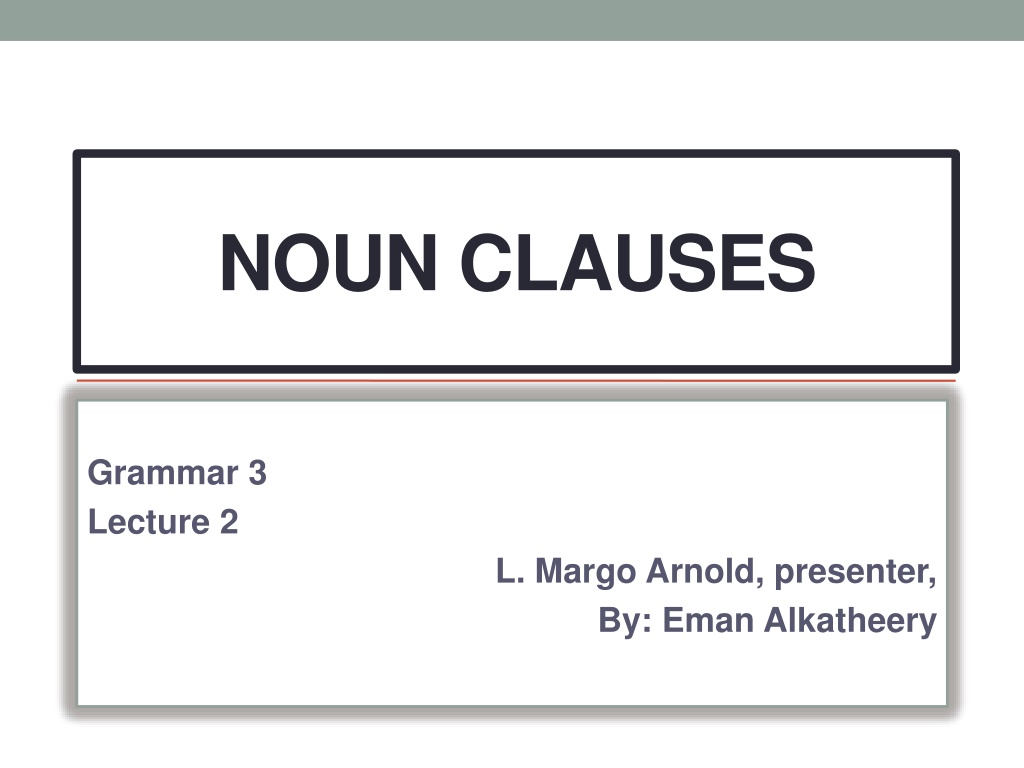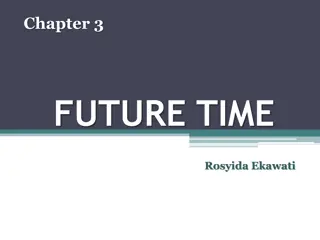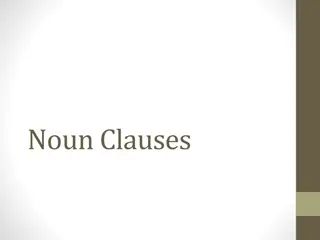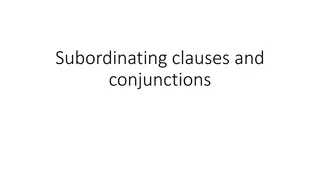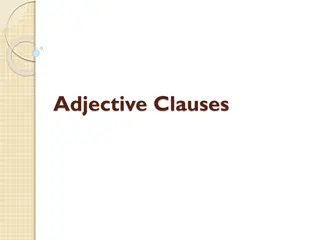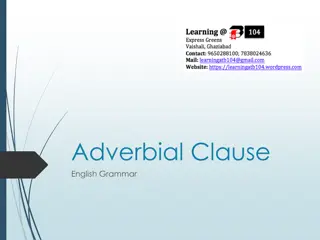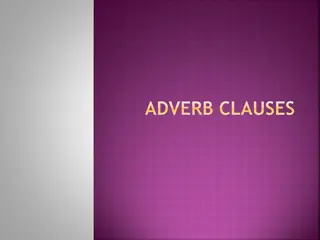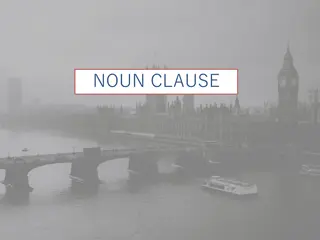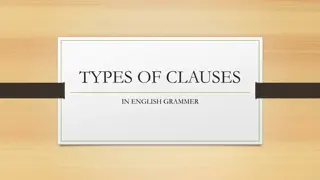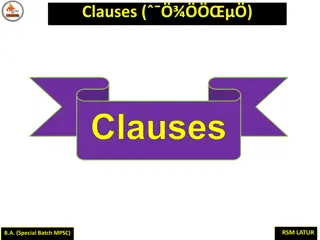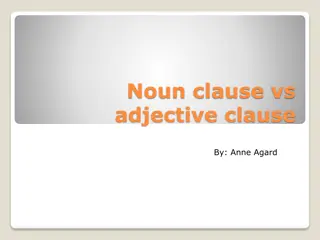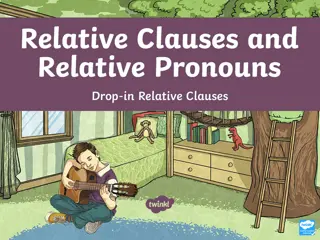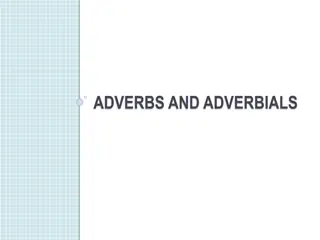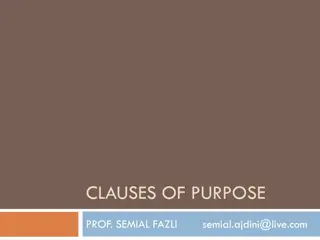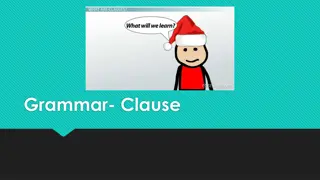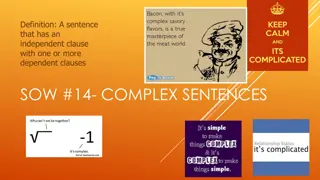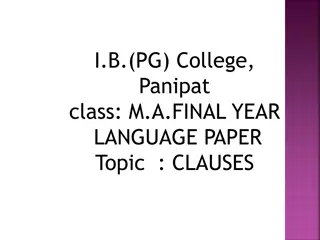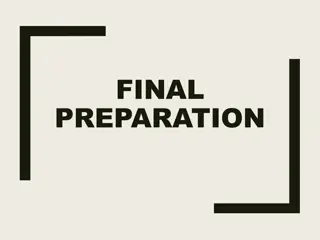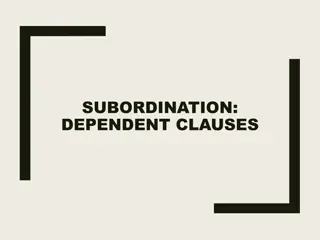Understanding Noun Clauses in Grammar
Noun clauses are dependent clauses that act as nouns in sentences, serving as subjects, verb objects, prepositional objects, and complements. They should not be separated from main clauses with punctuation. Noun clauses can appear at the beginning of a sentence or after certain nouns, adjectives, and verbs. Different types include that clauses, subjunctive clauses, if/whether clauses, and WH-question clauses. Examples and placement tips are provided for better comprehension.
Download Presentation

Please find below an Image/Link to download the presentation.
The content on the website is provided AS IS for your information and personal use only. It may not be sold, licensed, or shared on other websites without obtaining consent from the author. Download presentation by click this link. If you encounter any issues during the download, it is possible that the publisher has removed the file from their server.
E N D
Presentation Transcript
NOUN CLAUSES Grammar 3 Lecture 2 L. Margo Arnold, presenter, By: Eman Alkatheery
Eman Alkatheery Noun Clauses A noun clause is a dependent clause that functions as a noun in a sentence. It is used as a subject, an object of a verb, an object of a preposition, and a complement (table 7.1. p. 296). Never separate a noun clause from the main clause with commas or other punctuation marks since noun clauses are part of main clauses.
Eman Alkatheery Noun Clauses Noun clauses come at the beginning of a sentence or after certain nouns, adjectives, and verbs such as: Add Conclude Explain Illustrate Note Show Think Ask Believe Exclaim Find Hope Mention Say Wish Tell Remark Indicate Estimate
Eman Alkatheery Types of Noun Clauses 1. That clauses. It begins with (that). Example: She thought that the exam was cancelled. 2. Subjunctive clauses. It begins with (that). However, the verb of the noun clause is in the subjunctive mode. Example: It is urgent that Ali submit the report today.
Eman Alkatheery Types of Noun Clauses 3. If/Whether clauses. It begins with (if or whether). Example: The teacher wants to know if the students understood the formula. 4. WH-Question clauses. It begins with a question word e.g. where, what, who, when, or how. Example: I don t know who she is.
Eman Alkatheery Noun Clauses Examples: Subject That Ahmad can fly is unbelievable. The story is unbelievable. Object of a verb People once believed that the world was flat. They believed the story.
Eman Alkatheery Noun Clauses Examples: Object of a preposition I listened to what he said. I listened to the story. Complement A major concern is how fast these changes are happening. A major concern is the fast changes. Practice 1, p. 297
Eman Alkatheery Noun Clauses PART ONE: CLAUSES WITH THAT; REPORTED SPEECH (PP. 295 303)
Eman Alkatheery Clauses with that A that clause can appear in different places: 1. After the independent clause verb: The student hopes that his excuse will be accepted. 2. After some adjectives: Example: glad, sad, happy, worried, sorry, etc The class was happy that the teacher cancelled the exam.
Eman Alkatheery Clauses with that 3. After some nouns: Example: idea, theory, opinion, claim, fact, etc. People didn t believe the theory that the Earth revolves around the sun. 4. At the beginning of a sentence: That Huda came late was predictable.
Eman Alkatheery Clauses with that Examples: I think that she is a good writer. That Ahmad cheated in the exam was surprising. That Nawal needs a job is obvious. It is obvious that Nawal needs a job.
Eman Alkatheery Clauses with that Examples: That Sarah has no friends is a pity. The teacher mentioned that China has a strong economy. I am glad that my sister passed the math exam. It did not surprise me that Huda was late.
Eman Alkatheery Clauses with that Examples: I believe that motherhood is a big responsibility. That the sun rises from the east is a fact. The fact that the Earth revolves around the sun was proven.
Eman Alkatheery Quotations vs. Reported Speech Quotations are the exact words that a person has used to state something. They appear between quotation marks. In addition, quotations are preceded or followed by a comma.(Table 7.2., p. 299). We begin quotations with verbs such as say, tell, ask, wonder, remarked, stated, etc. Example: Susan said, Chris is at work. Chris is at work, Susan said.
Eman Alkatheery Quotations vs. Reported Speech Quoting more than one sentence: My brother is a student. He studies at KSU, she said. My brother is a student, she said. He studies at KSU. Quoting a question or an exclamation: She asked, When will you be here? When will you be here? she asked. She said, Watch out!
Eman Alkatheery Quotations vs. Reported Speech Reported speech involves paraphrasing. You tell the same ideas but with different words. There is no need for commas or quotation marks. Also, some changes are required in reported speech. (Table 7.2., p. 299). Example: Susan said that Chris was at work.* Susan said Chris was at work. * That is optional in the middle of this sentence
Eman Alkatheery Changes in Verb Tense with Reported Speech If the verb in the main (independent) clause is in the past, the verb in the noun clause (dependent clause) is changed to one of the past tenses (Table 7.3., p. 299) Quoted speech reported speech I watch TV everyday. She said she watched TV everyday.
Eman Alkatheery Changes in Verb Tense with Reported Speech Quoted Speech Reported Speech I am watching TV . Sarah said she was watching TV. Chris is at work . She mentioned that Chris was at work. I haven t finished yet . She added she hadn t finished yet.
Eman Alkatheery Changes in Verb Tense with Reported Speech Quoted Speech Reported Speech I have watched TV. He said he had watched TV. I went home . She told me that she had gone home. I am going to exercise . Ali remarked that he was going to exercise.
Eman Alkatheery Changes in Verb Tense with Reported Speech Exceptions: In reporting technical or scientific facts, the present is generally used. The world is round The teacher said the world is round.
Eman Alkatheery Changes in Verb Tense with Reported Speech Exceptions: If the verb in the main clause is in the present or the future, the noun clause is not changed. I watch TV every day . She says she watches TV every day. She has said that she watches TV every day. She will say that she watches TV every day.
Eman Alkatheery Changes in Modal Auxiliaries with Reported Speech In reported speech, some modal auxiliaries are changed to the past. (Table 7.4 , p. 300) Ann can help Chris. She said that Ann could help Chris. John may help. She added John might help. James will help Chris. She said that James would help Chris.
Eman Alkatheery Changes in Modal Auxiliaries with Reported Speech Must: When must expresses necessity, you change it to the past. However, when it expresses probability, it does not change. Ann must help Chris. She said that Ann had to help Chris. Susan must be tired. Joe said that Susan must be tired.
Eman Alkatheery Changes in Modal Auxiliaries with Reported Speech If the modal auxiliary is already in the past, no changes are required. Alex could help. He said Alex could help. Alex would help. He said Alex would help. Alex should help. He said Alex should help. Alex ought to help. He said Alex ought to help. Alex could have helped. He said Alex could have helped. Practice 2, p. 300
Eman Alkatheery Changes in pronouns, adjectives, and adverbials with Reported Speech You also have to change pronouns and demonstratives in reported speech. (Table 7.5 , p. 301). I need your help. She said she needed my help. They need my help. She said that they needed her help. These pages need to be corrected. She said that those pages needed to be corrected.
Eman Alkatheery Changes in pronouns, adjectives, and adverbials with Reported Speech I am a computer programmer in San Francisco. I grew up in India. I helped design several web sites. My hobbies are reading and swimming. Molly said that she was a computer designer in San Francisco, but she had grown up in India. She had helped design several web sites. She added that her hobbies were reading and swimming.
Eman Alkatheery Changes in pronouns, adjectives, and adverbials with Reported Speech Time and place expressions may also change. (Table 7.5 , p. 301) We need the work now. She said that they needed the work then. We will need the other pages tomorrow. She added that they would need the other pages the following day.
Eman Alkatheery Changes in pronouns, adjectives, and adverbials with Reported Speech Directional and time-related verbs may also change according to when and where the reported speech occurs. (Table 7.5 , p. 301) You should bring them here when you come to work. He said that I should take them there when I went to work.
Eman Alkatheery Changing Commands to Reported Speech To change a direct command to a reported statement, an appropriate subject and modal must be added e.g. should. (Table 7.6, p. 301). Finish your report by 10. My manager told me that I should finish my report by 10. My manager said that I should be sure to proofread it. Be sure to proofread it. The teacher added that I should make ten copies. Make ten copies.
Eman Alkatheery Changing Commands to Reported Speech Other modals can be used in reported commands depending on the strength of the command e,g. must, have to, need to, etc. Stop it! My mother said that I should stop it. Clean your room. My mother said that I had to clean my room. Limit your time on the internet. Dad told me that I had to limit my time on the internet. Practice 3 p. 302
Eman Alkatheery Noun Clauses PART TWO: CLAUSES WITH EMBEDDED QUESTIONS (PP. 304 310)
Clauses with Embedded Questions Information questions can be used as noun clauses. Questions words such as what, when, why, are used to begin such clauses. The subject precedes the verb like in statements. Auxiliary verbs added to form the questions are not used in forming noun clauses. (Table 7.7 , p. 305)
Eman Alkatheery Clauses with Embedded Questions I don t know where she lives. I couldn t hear what he said. She wants to know how much I ll make. She wondered how old Salma is. Where does she live? What did he say? How much will you make? How old is Salma?
Eman Alkatheery Clauses with Embedded Questions What time is it? Do you know what time it is? What time is it? I don t know what time it is. Do you remember where the lecture is? I am not sure where the lecture is. Where is the lecture? Where is the lecture?
Eman Alkatheery Clauses with Embedded Questions What did she say? What she said surprised me. When do they arrive? Do you know when they arrive? Whose pen is this? Do you know whose pen this is? Which one do you want? Can you tell me which one you want? Practice 1, p. 306
Eman Alkatheery Clauses with Embedded Questions Exercise: Combine the two clauses into one sentence using a noun clause: 1. Where is the bank? Could you tell me 2. What time does the next bus come? Can you tell me 3. Where did Sara go last night? Do you know 4. Where is the nearest super market? Do you know 5. How do you make a noun clause? Could you explain
Eman Alkatheery Clauses with Embedded Questions Answers: 1. Could you tell me where the bank is? 2. Can you tell me what time the next bus comes? 3. Do you know where Sara went last night? 4. Do you know where the nearest super market is? 5. Could you explain how you make a noun clause?
Eman Alkatheery Clauses with Embedded Questions P. 305 table 7.7 Why did you leave your last job? She asked me why I had left my last job. The tense is changed because it is a reported question and the verb of the main clause is in the past.
Eman Alkatheery Clauses with if / whether Yes/no questions can be used as noun clauses. If / whether are used to begin such clauses. The subject must come before the verb. Auxiliary verbs added to form the questions are not used in forming noun clauses.
Eman Alkatheery Clauses with if / whether If is used in both conversational and formal English. It implies that there is a yes/no answer. Whether is used in formal English. It implies choice among alternatives. (Table 7.8 , p. 306)
Eman Alkatheery Clauses with if / whether Do they have any job openings? I want to know if they have any job openings. Do you know if the manager is here now? Is the manager here now? I don t know if she will come. Will she come? I asked if Hassan needed help.* Does Hassan need help? *It is a reported question. The tense is changed to the past
Eman Alkatheery Clauses with if / whether I want to know whether Nada should talk to the manager (or not). the manager? Should Nada talk to Does she need an appointment? I would like to know whether she needs an appointment (or not). Do you know whether she will come (or not) ? Will she come? I wonder whether (or not) he needs help. Does he need help? Practice 2, p. 307
Eman Alkatheery Noun Clauses PART THREE: STATEMENTS AND REQUESTS OF URGENCY (PP. 311 316)
Eman Alkatheery Statement of urgency with that The subjunctive mood is used to replace commands. It is softer and less direct. The subjunctive form is the simple form of the verb, and modals are not used. (Table 7.9. , p. 312)
Eman Alkatheery Statement of urgency with that You put that, the subject, and the subjunctive after these adjectives (adjectives of urgency): Advisable Imperative Important Vital Best Urgent Crucial Necessary Desirable Essential If the statement is negative, the word (not) comes before the verb
Eman Alkatheery Statement of urgency with that Be on time! It is crucial that you be on time. It is important that you not arrive late. Don t arrive late! It is urgent that they discuss the matter. Discuss the matter! Make a decision immediately! It is vital that she make a decision immediately. Practice 1, p. 312
Eman Alkatheery Statement of urgency with that Compare: It is predictable that Noura will come late. It is obvious that Ali needs a job. It is urgent that Ali get a job. It is important that Ahmad study for the exam.
Eman Alkatheery Statement of urgency with that Exercise: Change the following commands into statements of urgency by using the given adjectives. Crucial, important, urgent Study for the exam, Ahmad. Arrange the files alphabetically. Wash your car.
Eman Alkatheery Urgent Requests with that The subjunctive is also used with noun clauses with that after certain verbs of requests. This form of request is formal and polite. The subjunctive form is the simple form of the verb, and modals are not used.
Eman Alkatheery Urgent Requests with that You put that, the subject, and the subjunctive after these verbs: (Table 7.10. , p. 313) Advise* ask* command* require* desire propose recommend suggest request urge* demand insist *They can be followed by both subjunctives and infinitives.
